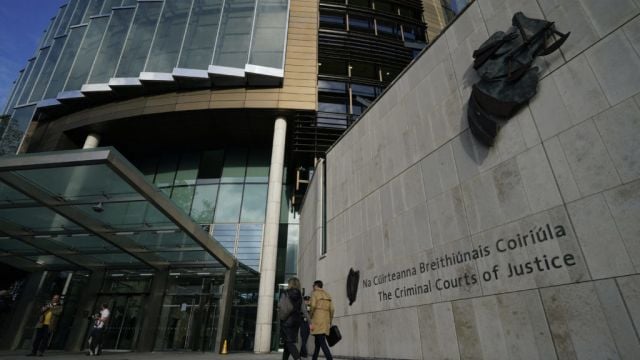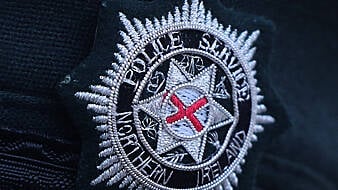A 49-year-old man was found naked in a field after he killed his wife at their rural Co Mayo home nearly four years ago, a jury has heard.
It was during the opening of the trial of James Kilroy at the Central Criminal Court on Wednesday that a prosecuting barrister said that a jury will have to assess if he was "simply guilty of murder" as the State contends or if he was insane at the time of the killing or suffered from a mental disorder that diminished his responsibility.
Ms Anne-Marie Lawlor SC, for the Director of Public Prosecutions, said a mental disorder did not include intoxication and that was important in the case.
The jury heard that Ms Valerie French Kilroy's body was found in a camper van on the grounds of her home, which was located in a remote rural area around 6km from Westport in Co Mayo.
She had died from strangulation with a ligature as well as blunt force trauma to the head and a stab wound to the neck.
Evidence will be given, said the lawyer, that Mr Kilroy was displaying "erratic behaviour" and was found naked in a field in the Westport area. He was taken to Castlebar Hospital where he was assessed and later told gardaí that he had "killed his wife and kids".
The three young children were later found unharmed.
Patrick Gageby SC, defending Mr Kilroy, made a number of formal admissions to the court on Wednesday on behalf of his client.
These included that the accused killed his wife Valerie French Kilroy, that the crime scenes were all properly preserved by gardaí, the accused was at all stages appropriately detained including any time spent in a garda station and that gardaí kept and retained all exhibits appropriately.
Charges
Mr Kilroy (49), with an address at Kilbree Lower, Westport, Co Mayo is charged with murdering mother-of-three Valerie (41) at their home on a date unknown between June 13th 2019 and June 14th 2019, both dates inclusive.
He has pleaded not guilty by reason of insanity.
Opening the prosecution’s case on Wednesday, Ms Lawlor said Mr Kilroy is charged with the offence of murder and the State says he is guilty of that offence.
Counsel told the jury that there are two parts to a crime; the physical act and the intention. In this case, she said the physical act of killing Ms French Kilroy was accepted by the accused. "What isn't accepted is that he had a guilty mind or the intention to cause the death," she added.
There will be evidence, Ms Lawlor said, concerning the psychiatric state of Mr Kilroy. A person is not guilty of the offence if they were suffering from a mental disorder, she said.
"That is the first hurdle, were they suffering from a mental disorder, that does not include intoxication, that's important as you will see in this case. That is the first issue you will be asked to determine," she stated.
The second issue, the prosecution barrister said, that the jury will be asked to determine is whether the accused has a mental disorder and whether he knew the nature of what he was doing or knew it was wrong or was unable to stop himself.
Another legal provision that the jury will be hearing about in the course of the trial is the defence of diminished responsibility, said the lawyer.
"If you are satisfied that the person had a mental disorder and was suffering from it at the time but it wasn't such as to justify a finding of insanity but that it had diminished substantially the person's responsibility of the act, then the person can be found to fall under that section of diminished responsibility," she explained.
Mental state
The court heard further evidence will come from a variety of experts as to what Mr Kilroy's mental state was at the time and whether he has a mental disorder.
The jury will then have to assess if he had a mental disorder that diminished his responsibility. "Or is he simply guilty of murder as we say to you," she added.
The defence of insanity or diminished responsibility is on the balance of probabilities and not beyond a reasonable doubt, she said.
Outlining the facts of the case, Ms Lawlor said Ms French Kilroy was a senior occupational therapist for Mayo Mental Health Services and had married the accused man in April 2008.
The Kilroy's lived in a bungalow in a remote rural location in Mayo, around 6km from Westport and 11 km from Castlebar. She also indicated to the jury that this was where Ms French Kilroy had been killed.
On the night of June 13th 2019, Ms French Kilroy had arrived home after spending an evening with a friend and her body was found the following afternoon by gardaí, said the barrister.
Counsel said the evidence will be that gardaí were first notified of Mr Kilroy's actions in or around 3am on the morning of June 14th, when a woman contacted gardaí to say that a man had come to her door in Doon in Westport.
She said the man told her that he had travelled the world a few times over and that he was displaying "erratic behaviour". But when gardaí arrived at the house there was no one there.
It is accepted that the man was the accused Mr Kilroy, said Ms Lawlor.
Naked man in field
The court heard that later the same morning around 9.40am another man, who was also living in the Westport area, contacted gardaí to say he saw a naked man in a field. She said the jury would hear a "potted account" from this witness.
The court will also hear evidence, the lawyer said, from a female garda who dealt with Mr Kilroy and said the accused was disoriented. Mr Kilroy was brought to Castlebar Hospital where he was required to be assessed.
When Mr Kilroy was in the hospital he said he "killed his wife and kids", which immediately prompted gardaí to see if this was true.
Gardaí arrived at the accused's home at 2.55pm following the admission and "thankfully ascertained" that the children had not been the subject of any assault and were unharmed, counsel said.
The barrister further stated that gardai found Ms French Kilroy dead in a camper van on the grounds. A post-mortem confirmed she had died from ligature strangulation as well as blunt force trauma to the head and a stab wound to the neck.
In relation to the evidence against the accused, Ms Lawlor said Mr Kilroy was released from Castlebar Hospital after it had been determined that he did not meet the criteria to be held there.
He was later arrested and interviewed on four occasions.
"He indicated to gardaí much about his own life, his use of drugs and how on the evening he slit the throat of Valerie and the circumstances in which he said he did that," said Ms Lawlor.

Counsel said the defence will invite the jury to conclude Mr Kilroy did not have the necessary guilty mind and will call "psychiatric evidence to that effect".
The prosecution will also call evidence and the jury will have to weigh up the inconsistencies, she said.
"When all that is concluded it is up to you, assess expert evidence in the same way you do any evidence in a case. You can accept some of it and reject some of it," she said.
"We say and we will invite you to conclude that Mr Kilroy killed his wife and when he did so he was not suffering from a mental disorder and even if he was that none of the criteria under section 5 of the Act [Criminal Law Insanity Act 2006] apply," she concluded.







